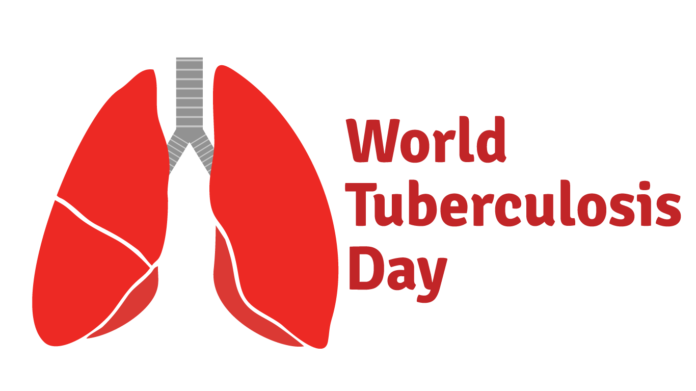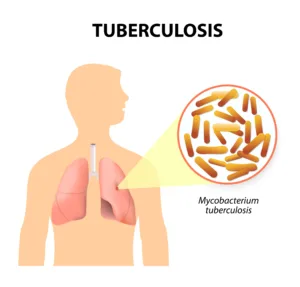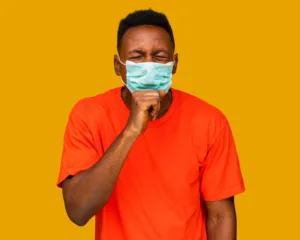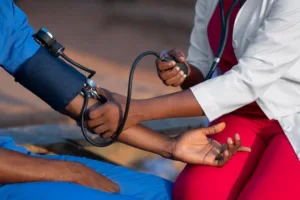
On World Tuberculosis Day, Ghana joins the global community in raising awareness about the ongoing battle against tuberculosis (TB), a disease that still affects millions of people worldwide. The World Health Organization (WHO) defines tuberculosis (TB) as an infectious disease caused by the bacteria Mycobacterium tuberculosis. TB is an ancient disease, and eradicating it has long been a human aspiration. This article delves into the current state of tuberculosis in Ghana, strategies for combating it, challenges encountered, and the hope for a TB-free future.

According to WHO, approximately one-quarter of the world’s population is latently infected with the causal agent. Globally, an estimated 9.9 million new tuberculosis cases were reported in 2020, with 1.5 million dying from the disease, making tuberculosis the second leading cause of death from a single infectious agent, trailing only COVID-19.
Understanding Tuberculosis in Ghana
In Ghana, tuberculosis began long before independence. The Ghana Health Service (GHS) reports that when the colonial rulers realized the necessity to treat the disease owing to the damage it posed to society as a whole, the Ghana Society for the Prevention of Tuberculosis was founded to support and supplement the government’s efforts to combat the illness in July 1954. In the early 1960s, the Ghanaian government financed nurses to train in Israel for TB management. It was also discovered that, during the same time period, Mobile X-Ray Vans were employed for widespread TB screening.
Despite efforts to reduce tuberculosis, it remains a major public health concern in the country, causing morbidity and mortality and accounting for thousands of new cases each year. TB accounts for around 5% of all deaths in Ghana each year, and the fall in TB burden is strikingly slow, with an average 2.5 percent reduction in TB incidence year on year (GTB, 2018). According to the Copenhagen Consensus Center, the TB incidence and mortality rate in Ghana in 2020 are expected to be 143 and 49 per 100,000 population, respectively, meaning that one-third of our predicted TB cases die from the infection. In 2023, Ghana reported 19,000 tuberculosis cases. It is concerning to observe that barely one-third of the expected incidence is reported at health centers.

Strategies for Combating TB
Pursuant to research, one of the most effective strategies for combating tuberculosis is early detection through expanded screening and diagnosis programs, and efforts are being made to promote access to TB testing facilities, particularly in rural and underprivileged regions.
Increasing treatment adherence is one of the most effective strategies. According to a Copenhagen Consensus Center analysis, up to 70% of people with tuberculosis do not receive treatment each year. Approximately 15% of persons enrolled in therapy have poor treatment adherence and outcomes, or are lost to follow-up. Ensuring that TB patients follow their treatment regimens is critical for achieving positive outcomes and limiting the development of drug-resistant TB. Health education and counseling are essential for increasing treatment adherence.
Another strategy for combating tuberculosis in Ghana is to strengthen the country’s healthcare systems. Building quality healthcare systems capable of providing comprehensive tuberculosis care is critical. This includes educating healthcare personnel, enhancing laboratory infrastructure, and ensuring the supply of critical pharmaceuticals.
Challenges Faced
Despite improvements, poverty, overcrowding, and restricted access to healthcare, as well as a number of other problems, impede Ghana’s fight against tuberculosis and contribute to the country’s high TB burden, including stigma and prejudice, a lack of money, and treatment resistance.
Many communities continue to stigmatize tuberculosis, which delays diagnosis and treatment initiation. To reduce stigma, it is necessary to address misconceptions and raise awareness. Adequate funds is also required for the implementation of TB control programs. However, a lack of resources makes scaling up interventions and reaching all affected persons difficult.
GHS reports that the rise of drug-resistant TB strains poses a severe danger to TB control efforts. They also stated that, while great progress has been made in detecting both drug-resistant and drug-sensitive TB patients since 2016, addressing drug resistance will necessitate investment in laboratory capacity for drug susceptibility testing as well as the availability of second-line TB treatments.
READ ALSO Did You Know March 24 is the International Day for the Right to Truth…?
Hope for the Future
Despite the challenges, there is hope for a TB-free future in Ghana. Efforts have been made to improve access to tuberculosis diagnostic and treatment services, especially in rural and disadvantaged areas. As revealed by GHS, the adoption of new technology and methodologies, such as GeneXpert testing and digital health solutions, has the potential to improve TB diagnosis and treatment outcomes.
Collaboration among government agencies, non-governmental organizations (NGOs), and international partners is also critical for enhancing TB control efforts and properly allocating resources. Ghana maintains a National TB Control Program (NTP) that coordinates TB prevention, diagnostic, and treatment efforts throughout the country. The NTP collaborates with a variety of stakeholders, including government agencies, non-governmental organizations (NGOs), and foreign partners, to develop TB control measures.

Engaging communities in tuberculosis prevention and control activities encourages people to take an active role in combating tuberculosis while also overcoming hurdles like stigma and mistrust. Community outreach programs, peer education, and TB support groups are all initiatives aimed at raising knowledge of tuberculosis, reducing stigma, and encouraging early detection and treatment-seeking behavior.
These strategies, combined with ongoing research and advocacy activities, reflect Ghana’s commitment to eradicating tuberculosis and mitigating its impact on public health. However, additional investment, collaboration, and innovation are required to expedite progress toward TB elimination in Ghana.
READ ALSO: Funding shortfall threatens tuberculosis treatment in Ghana
On World Tuberculosis Day, let us renew our commitment to combating tuberculosis in Ghana. We can work toward a future in which tuberculosis no longer threatens our communities’ health and well-being by implementing evidence-based strategies, resolving problems, and inspiring hope via innovation and collaboration. Together, we can eradicate tuberculosis in Ghana.




